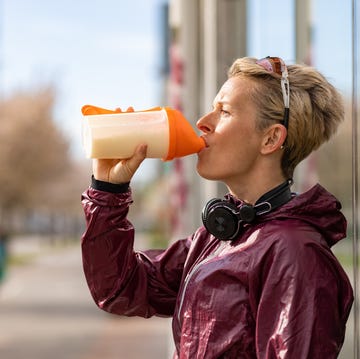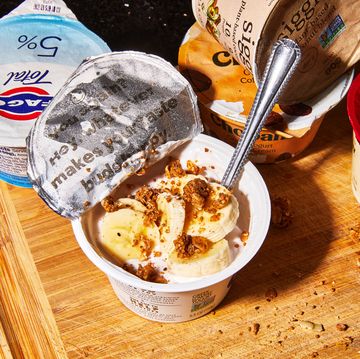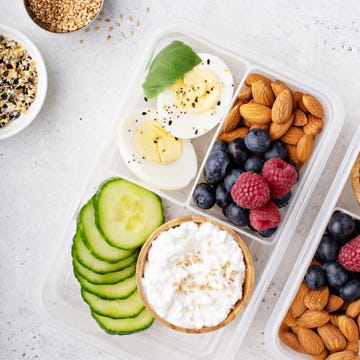Runners need more protein than couch potatoes (obviously) and more even than other athletes (surprisingly). "Protein is broken down into fuel during long runs and used to repair muscle damage after a workout," says Janet Bond Brill, Ph.D., R.D. But hang on before you grill that steak. Studies show the unhealthy saturated fat and cholesterol found in diets heavy in red and processed meats are associated with heart disease and cancer. On the other hand, plant-based diets can reduce your risk of high blood pressure and diabetes and keep weight in check. That's why runners—even carnivores—should consider eating more vegetarian sources of protein, like soy, legumes, and nondairy milk. It's a good way to meet your protein needs and sneak in additional carbs, fiber, vitamins, minerals, and antioxidants. These six nonmeat options make delicious additions to any meal.
Tofu
Tofu is made from soy milk curds that have been pressed into a block. The result is a smooth, soft texture that handily adopts the flavors of whatever sauces and spices it's paired with. Most impressive? For only 88 calories per half cup, tofu offers 10 grams of protein and a modest five grams of fat. Tofu is rich in heart-protective compounds called isoflavones; preliminary research from Columbia University found that these compounds may produce enzymes that create nitric oxide. This substance keeps blood vessels healthy and may boost bloodflow and improve muscle function—potentially good news for your PR. Isoflavones are also antioxidants that can speed recovery by reducing free-radical damage in muscles postrun, a 2009 study found.
Eat It: Tofu, in the refrigerated section at your grocery store, comes in a variety of textures (extra-firm, firm, soft, and silken). Making lasagna? Use silken tofu in place of ricotta cheese, says Kristine Duncan, M.S., R.D., a nutrition instructor in Mount Vernon, Washington. Or slice firm or extra-firm tofu, cover with your favorite spice rub (try Cajun or BBQ), and grill or sauté.
Tempeh
This nutty-flavored meat substitute gets its chewy texture from whole cooked soybeans that are fermented and shaped in a mold. With much less processing than tofu, tempeh retains more of the soybean's nutrients, like protein and fiber, explains Brill. You'll find 19 grams of protein in a half cup plus nine grams of fat (only two of which are saturated fat) and four grams of fiber. That's an ideal trifecta for keeping a hungry runner's appetite at bay between meals, she says. Tempeh also packs nearly 10 percent of your daily need for calcium. One study in the International Journal of Food Sciences and Nutrition found that the body absorbs calcium found in tempeh just as well as that in cow's milk, making it a good option for dairy-free athletes.
Eat It: Like tofu, tempeh will soak up whatever flavors it's prepared with. But unlike tofu, which you can eat uncooked, it's best to heat tempeh before eating it. Brill suggests chopping it into bite-size pieces, tossing with your favorite marinade or sauce, and adding to a stir-fry.
Seitan
"It's a great alternative for carnivores or vegetarians who miss meat," says Brill. "Made from wheat gluten, it's got a hearty 'beef jerky' taste and texture." A half cup packs 32 grams of protein—more than a 3.5-ounce chicken breast. Seitan (pronounced "say-tahn") can be pretty salty, as some brands supply more than 20 percent of your daily sodium limit per serving. That's not a huge concern for runners, says Duncan: "If you're losing sodium through sweat during hot runs, you can fit in a few high-sodium foods safely." If you are cutting down on sodium, downsize your portion to a quarter-cup serving for a still-impressive 16 grams of protein.
Eat It: Buy packages of ground seitan and stir into tomato sauce as a topper for pasta or pizza. Sauté seitan strips with olive oil and herbs until brown and top off a Greek or Caesar salad. Stash a seitan jerky strip (try the Primal brand) in your bag for a postworkout hit of protein.
Walking Could Add 11 Years to Your Life, Study
Beans pack similar amounts of protein–six grams in pinto, nine grams in edamame, and 10 grams in navy—per 100- to 150-calorie half cup. If you're worried about, ahem, flatulence, know that fewer than half of people who ramp up their bean intake report GI issues, per a Nutrition Journal study. Make room in your diet for lentils, too. Similar in protein to beans (nine grams per half cup), they offer 18 percent of the Daily Value for iron—twice that of many beans. Iron shuttles oxygen to cells so you can maintain high energy during tough workouts.
Eat It: In a food processor, puree one cup of canned beans with garlic, olive oil, and salt; spread on sandwiches or use as a dip. Pairing vitamin C with iron-rich foods will improve your body's absorption of iron, research shows. Duncan makes a vitamin C—rich lentil salad by combining lentils, celery, carrot, mango, cilantro, parsley, and feta, tossed with vinaigrette.
Nondairy Milk
Dairy is a major source of bone-building calcium and vitamin D. Research shows that increasing your intake of these nutrients can spur fat burning. But you can get both from nondairy alternatives. For one that rivals cow's, try soy milk. "It's hands-down the favorite out of the bunch in terms of protein, with six grams per cup compared with eight in cow's milk," says Brill. Another option? Unsweetened almond milk. With 30 to 40 calories per cup, the hint-of-sweet, nutty milk is ideal for weight-conscious runners. It's naturally low in protein with only one gram, so look for brands that add more. For a mild option for your morning cereal, go for oat milk. The oats make it naturally higher in carbs and sugar, but that's a plus if you drink it as a prerun snack.
Eat It: Find nondairy milk next to regular milk at the supermarket or in shelf-stable packaging near the cereal aisle. Drink a glass of chocolate soy milk for a recovery snack. Mix oat or almond milk in place of water or milk in pancake batter. Add a small scoop of powdered soy milk to soups, smoothies, or hot cereal for "a sneaky protein boost," says Duncan.
High-Protein Snacks for Runners
"There's good reason chia seeds are the newest nutritional superstar," says Brill. This power food pumps six grams of protein and 10 grams of fiber into two tablespoons. You also get five grams of alpha linolenic acid (ALA), a plant-based omega-3 linked to lower rates of heart disease. Ground flaxseeds are also rich in ALAs. Both are excellent sources of manganese, a mineral that converts fat and carbs into energy, and one in which more than a third of adults may be deficient. Make nuts your postrun snack of choice. "Nuts offer varied nutritional profiles—some are rich in calcium and magnesium; others, potassium—so eat lightly salted mixed nuts to replace the range of electrolytes lost through sweat," says Duncan.
Eat It: Add ground flaxseeds to pancake mix. Chia seeds expand and become gel-like when wet. Make a tapioca-like pudding by stirring seeds in water; top with fruit, honey, and cinnamon.













